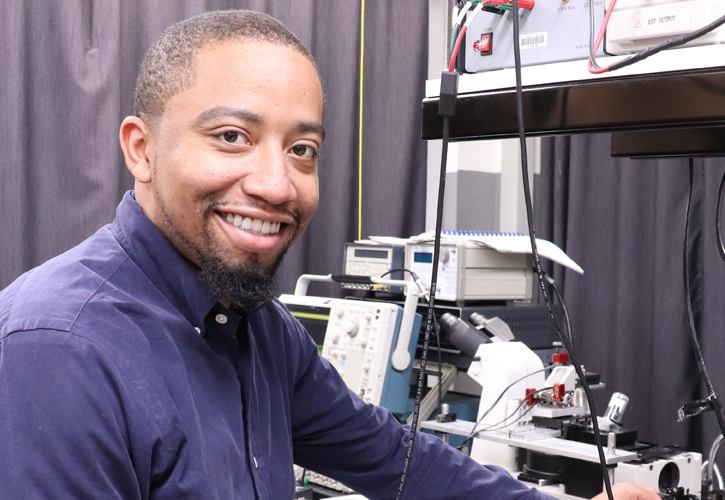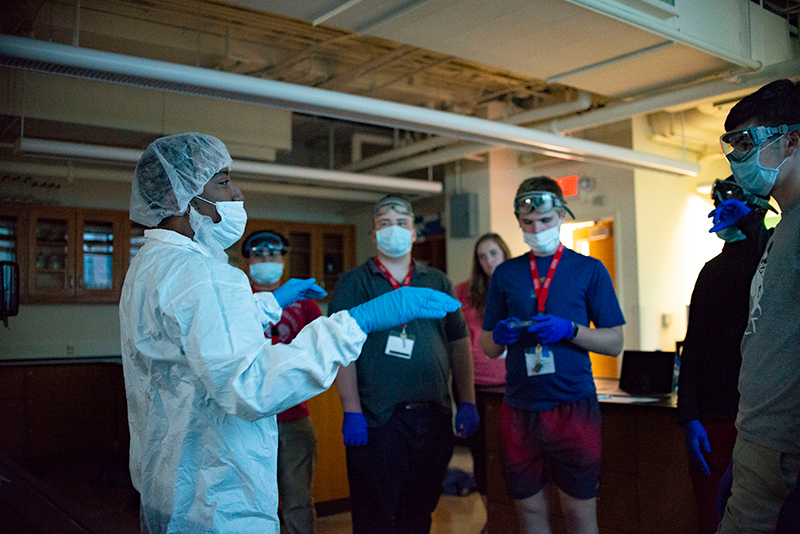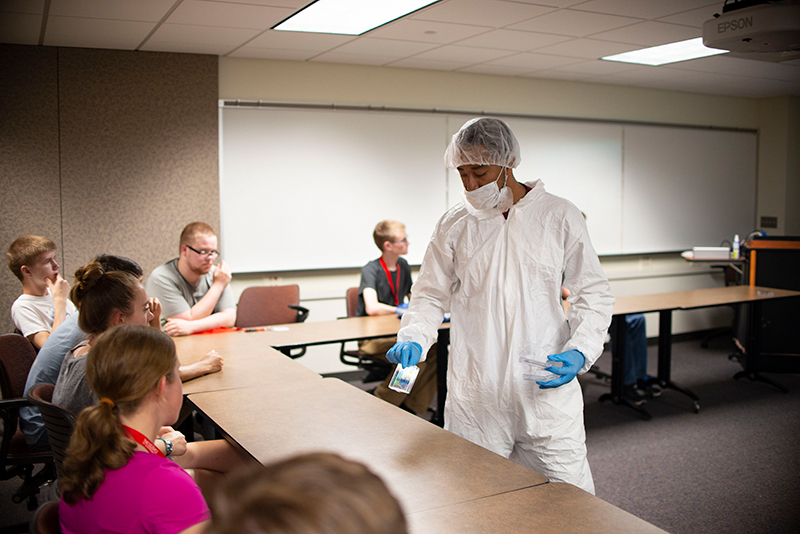College of Arts and Sciences Newsroom

Ford Foundation Fellow
The Ford Foundation awarded electro-optics doctoral student Joshua Burrow a fellowship — the first in the University of Dayton’s history — to support the final year of his dissertation writing and defense.
The $25,000 Ford Foundation fellowships are awarded at the predoctoral, dissertation and postdoctoral levels to help increase faculty diversity at colleges and universities nationwide. Recipients demonstrate superior academic achievement, are committed to a career in teaching and research at the college or university level, show promise of future achievement as scholars and teachers, and are well prepared to use diversity as a resource for enriching the education of all students.
“It’s quite an honor,” said Burrow, a Baltimore native who received a master’s degree in electro-optics from the University in 2017. He credited his leadership and community outreach for the award — one of 36 bestowed this year for dissertation research. He also noted that achieving greater diversity aligns with President Eric F. Spina’s strategic vision for the University.
Burrow mentors about 100 Dayton-area high school students each year at an annual, two-day summer nanofabrication workshop hosted by six research groups within the School of Engineering. The event gives students hands-on experience of working in a nanofabrication laboratory. He also mentors undergraduate students from two minority-serving institutions, Morehouse College and St. Mary’s University, through an annual Department of Physics summer research program.
In addition, Burrow participates in Morehouse’s annual Nuclear, Materials, Space Sciences (NuMaSS) summer program — a four-week science initiative for high school students hosted by the historically black college in Atlanta. He holds bachelor’s degrees in mathematics and physics from Morehouse.
“Giving back to some up-and-coming scientists is important for me, because if it wasn’t for the help of many others, I wouldn’t be where I am today,” Burrow said. “I feel like it is my duty to give back to the next generation of future scientists, researchers and engineers.”
Burrow serves as a student representative and board member for the National Society of Black Physicists (NSBP). He is responsible for creating and maintaining NSBP student chapters, and is working to create an annual student leadership conference in partnership with the National Society of Hispanic Physicists.
He served as University student chapter president of the Optical Society (OSA) and International Society of Optics and Photonics from 2016 to 2018. In that role, he co-organized the 2018 International OSA Network of Students (IONS) Midwest U.S. conference last August on the campuses of the University of Dayton and Purdue University.
“If you are looking for an exemplary member of the departments of electro-optics and physics, Josh is probably it,” said John Erdei, associate professor and Department of Physics chair. “IONS was a serious effort. There were seven IONS conferences internationally and one in the U.S. He won to get the U.S. conference here, jointly between Purdue University and the physics department at UD.”
Burrow’s current research with assistant professor of physics Imad Agha and professor of electro-optics Andrew Sarangan involves rapidly manipulating and changing light to achieve various functionalities, which could have applications in next-generation televisions, electronic ink and other technologies. He was working under a National Science Foundation grant in the Electrical, Communications and Cyber Systems division, but those funds will now transition to another student researcher because of his Ford Foundation award.
As a Ford fellow, Burrow will attend the foundation’s annual fall meeting, which includes professional development sessions and opportunities to speak with publishers, gain professional insights and advice, and network with other current and former Ford fellows. In the future, he may be called upon to lead workshops, speak at conferences and participate in the review process of Ford applications.
“The Ford fellow community is a good network to have,” he said. “Many current associate professors are Ford fellows and you get access to those people, so if you would like to become a professor at Harvard, Yale or somewhere like that, you can speak with some of the Ford fellows who previously received a fellowship.”
After completing his doctorate, Burrow plans to pursue a prestigious post-doctoral fellowship at a national laboratory or an “R1” research institution.
Administered by the National Academies of Sciences, Engineering, and Medicine since 1979, the Ford Foundation’s fellowship programs offer about 70 predoctoral awards, 36 awards for dissertation research and 20 postdoctoral awards each year. The program goals are to maximize the educational benefits of diversity, and increase the number of professors who can and will use diversity as a resource for enriching the education of all students.
- Dave Larsen, communication coordinator, College of Arts and Sciences


